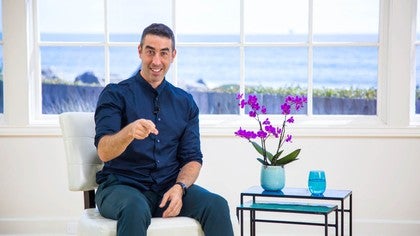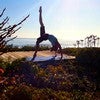Description
About This Video
Transcript
Read Full Transcript
Hi, I'm Jared Kaplan. Thank you for joining this talk called talk the talk. We're looking at how we can help you love what you do for the long haul. We're gonna break down what that means in a minute. But what I want to tell you is that if you're kind of getting into holidays for the first time teaching a bunch of privates and maybe some good classes on the side or on the side gig hustle, this may not be the video for you. If you're looking for inspiration physically and all the amazing tricks and moving inspiration, by all means, look at some of my other videos or the incredible teachers on this platform for movement inspiration. This is about business and your practice, so you can stay connected and present with what you love to do.
A little bit about me. So I trained over a thousand clients a year for over 15 years. I've run studio 26 now for over nine years. So I made tons of mistakes in that time. I know what it's like to set yourself up not so well and be out of alignment with your practice.
And I have started to really learn in that time how to set myself up a little better each day, hopefully each year so that the effectiveness of what I'm doing in terms of running my practice and my studio is much more successful for what I want in my life. I'm going to share with you some of the insights of things that I've learned and I wish I had known when I was a younger professional and I hope that that's useful for you in what you're up to. You're here because you're curious and you're looking for some solutions to things that may not be going so well. It's hard to be in this business. We all tend to fall in love with movement and we ended up running a practice that we might not have thought about. What are the mechanics of how to run it? How do you actually structure things so you can sustain yourself for the long haul? More on that to come, I am here to help you love what you do for the long haul.
Let's break down that sentence. What you do, what you love to do. The love part is the most important. What actually got you into this? If you think back, and I asked this to my clients in terms of trainers who I work with as a coach, what got you into physicality? Was it that you were an athlete or a dancer or you had a transformation story that led you to have a physical journey that said, Oh, I want to offer this to other people? What is your why? You already know what it is. If you do a very simple exercise, I'm going to have you do this in a second. If you actually write down what got you into what you're doing, did you stumble into, applaud his class, that local college?
Did you have a friend that said, Hey, we should go do this thing? Did you start working out for whatever reason? What was it mechanically that actually got you into it? So go ahead and write that down for yourself right now. Now that you've written down exactly what got you into it, your personal history.
I want you to take one more layer and actually look at what you wrote and see what it is that actually fuels you from that. Not how you got into it, but what it is that actually lit you up in that practice. What gave you joy? What made you inspired? What is it about the feeling or maybe your own story that you wanted to give to others? Write that down next. So now that you've done a little bit of a self awareness exercise, let's talk about the love of what you do a little more. We all tend to fall in love with physicality. You've just thought about yours.
You might be an amazing problem solver who's able to get someone's C6 to balance oversees seven so their their thorax moves much more efficiently. That's amazing. It might be that you can give someone a kick ass workout, but what you're actually delivering and what you got into at four isn't really about the mechanics of teaching Polonius. You love it. Maybe for a deeper layer and I'm asking you to think about and nudging you to challenge the Subutex, what you're actually up to, what's in it for you, and then the what you do is also then about what's in it for your client, where those two things meet, or maybe they're in misalignment can set you up for success or they can actually set you up to burn out. Once you're clear on the love, let's actually dive into what it is that you're doing. The what part, obviously, if you're applauding a teacher or a group, class instructor, private session teacher, a presenter, if you're on anytime, whatever the case may be, that's your title. But again, underneath that, what is it that you actually bring to the table as an individual? No two sessions are alike. No two people teach the same class. They may even take the same exercise, but someone's coming to this one for one reason.
They're going to that one for a different reason. No one's going to actually sell the same thing, even though the mechanics, again look the same. So if you to think about what it is that you're actually offering, which is the jobs to be done theory, what does the actual work, what does someone actually showing up for? If you don't know, they might actually be worth asking. For me, what happened was I actually quizzed a bunch of my clients and I had them write a small version of a testimonial and said, Hey, I'm just curious. What is it that you're getting out of these sessions? It might be that it's about accountability.
It might be that it's about a break from work to home. They just want a moment to kind of move. It may be about a specific physical goal, but asking them takes the burden of you saying, Oh, well, you know, I teach plays and all the assumptions you bring to that story, you might get some different information. For me, it was only when I actually asked some people that I trusted as clients who had been seeing me for a long time to tell me their version of what our sessions did for them in their life. That I got amazing insight information. Also got some useful testimonials that can put on a website, but it was actually more about for the learning part for me to understand what was the value I was bringing and why were they choosing me instead of someone who went to the exact same training program where I had been studying for way longer than me. There's something about our connection that made sense for them and I wanted to understand what that so I could see what the actual product I was delivering was. The other part of that is sometimes we think we're doing one thing.
Clients might think you're doing something totally different. So for me I was like, Oh, I'm going to be problem solving and is deeply, you know, kinetic way that implies all my studies and really improves someone's motor control and I can pull threads apart and make them move better. That's all kind of obsessing on physical stuff, which I personally love. So my clients just wanted a time at eight o'clock on a Monday night to get out of their work brain and move a little bit. I could've saved myself a lot of work and I only just known that that's all they were coming for. So for you to understand on one side, what is it that you are actually doing? And then knowing your client's side, what are they coming for, what are they actually showing up for?
And then are you aligned? And so obviously we're talking about alignment in a different way here. It's not about a posture. What is it that you're offering? What are they showing for? And then do they meet up? And again, if they're well aligned, which we know physically power, output, longevity, things are gonna flow better, they're going to pump better. They're going to work better out of alignment dysfunction. This is, you might be in trouble.
The last point I wanna make on when we say the what you do, we might say I'm a trainer, but when you do this exercise to ask your clients what they're actually perceiving and experiencing from your sessions with them, it might be that you're a friend to people, might be that you give people support. Maybe it's a, I am a transformational leader that helps people actualize themselves. We didn't say plots in there, we didn't say trainer in there, but if you dig down into it, you might find some really useful adjectives where identifiers that help clarify for you what you're offering and then you might actually be able to retain a very different clientele that's better aligned for you for the long haul, the long haul. How long do you want to be doing this? Like, seriously, how long do you want to be doing this? I fell into it. I didn't think I was gonna be teaching as long as I did. I didn't think I would have a studio as long as I do, but being present in what I'm doing and being able to be nimble enough and honest enough to change that I needed to help me out. So I want you to take a second and really think about when you fell into what you're doing. And again, I think most of us fall into it.
I've never heard of five-year-old kids say, mom, I really dream of being, applaud his teacher someday. If you've heard that sent me the video, I want to see it. I just don't think it's happened. We all came into it from various reasons. We light up for amazing, amazing effect and value and transformation. But then there's this business side. So the long haul, what is your plan? Maybe you don't have one. That's totally fine. I certainly didn't when I started, but if you want to sustain, if you want longevity in this field, you gotta be really clear about how you get there.
And one of the reasons that I'm here on this amazing platform, not platform, not teaching the a hundred or the teaser in certain ways, is because I care really deeply about preventing the burnout that I've seen. There are too many talented teachers, and I've said this before, but I will keep saying it. Sorry Christie. I'm going to say ad nauseum until it gets through. You got us sustain. And if you're not, you're shooting yourself in the foot and you're also wasting the time of people that are helping to support you. And the fact that you've studied for 10 years, 20 years might be an amazing presenter. If you're burnt out, we all lose on your gifts and I've seen it time and again where people fall into a thing, they then get burnt out. We lose all the talent that they had accumulated over so many years and they stopped teaching because they can't sustain it anymore. It's too stressful.
There's too much stress. They can't make ends meet. Those are all critical issues, not just for you, but for the entire industry and we as a collective have to make a dent on that. Now what you do matters. We all have stories around it. We all connect to it in our own way and in different ways. It's critically important.
I would say now more than ever in terms of connecting to physicality in a real way to sustain that for the long haul is ever more important. My hypothesis has been that because of the way that we fall into fitness and physicality and plotters and wellness, we lack structure. We are wildly rigid and accountable within our physical workouts to the point where we're, we will obsess and argue and post till we're blue in the face about one red Spang versus one blue spring and who did it when and why and how. That's all on the physical side, so we're really rigid in our practice and then we lack practicing business and wildly weak, inefficient sometimes don't even know what's happening. That's an issue. There is no roadmap for what we do. Just doesn't exist.
People in the past either fell into opening their own studio because that's what someone did before. When you copy someone else's success, no matter how successful they were or on the short term how successful you are, there's not really going to be a longterm payoff. There are too many variables. Things change, platforms change, geography changes. There's too many things to take control over and be present with to copy someone else's thing. And in this industry in particular, there's just not a map on it. And one little note also is about mentorship. While we all have incredible teachers that we perhaps have studied with and spent years either following learning from, apprenticing with or actually having as mentors physically.
I don't know that many people who are acting as mentors in the field on the practice side, on the business side, and by mentorship I mean this, I mean someone who like we do as a trainer, what do we do as a trainer? We studied for years on how to hold space for someone else coming to see us for their goals. We don't tell them everything that we should be doing. We don't tell them what worked for us. Maybe to help out or demonstrate, but we really are holding space for them to have a movement experience. I imagine that's why a lot of us come to please anytime, for example, to learn, okay, what's something that I can do for this type of client? What's what I can do for this client? Oh, I had this person show up.
I don't know how to deal with them. Let me learn. So we spend a lot of time studying how we can hold space for others physically. On the business side. I don't see people doing it and it is an issue. Mentorship is about holding space for someone else. You're going to practice all the things that you've learned as a mentor, but it's about the other person who's coming to you and their goals.
There's also a time based component to do one workshop in a year. There's a lot that happens on the other 360 days of that year that can go astray and on the practice side, which if it's not well tended to, your studio might have to close. Your clients might go somewhere else. If you're not taking care of your practice, where are you really in the long term? Short term, have fun, go at it, but mentorship is a very different thing and this is not to disparage in any way the amazing elders, teachers that I've certainly benefited from people who've had major success in the industry and I have sustained a really long time. It's not about that. It's about looking at the practice of what we do and holding ourselves accountable with rigor and over time the rigor is real. We know physically where you put your attention, where you put input is what you're going to get back.
Where you focus is where movement occurs. We know that we coach it, we cue it all the time. Where you focus is where growth happens. So on the business side, where can we put our attention? That's what some of the following videos will be about in broad strokes for now, what is it that you need to do to put your attention on what are the weak spots? So I'm gonna take you through a couple of exercise exercises that will address that. Personally for me, again made lots of mistakes. I had to create an insane amount of structure to hold myself accountable.
We're talking spreadsheets, time audits, trackers, ask people at my studio I have spreadsheets for everything. I kind of locked myself in my office and I go through things not cause I as like a 10 year olds like, Oh I want to work on spreadsheets all day. I would have become an accountant, not my jam. But the value of that as a rigorous way to hold myself accountable and create structure. In an issue that doesn't have it is really important. It's been really valuable for me.
So some of the tools that I'm going to guide you through our simple exercises, no big deal but useful hopefully to give you some structure to the things that you need to work on with these exercises. My hope is that I'm offering you something of a life vest or raft to make things just a little bit easier. I know how hard it is. I know the struggles. I know that if you are sitting listening to this talk on a subway or in a car on your way to your second studio of the day to see three more clients than you are a group class tonight. And you miss that last sentence cause you're a shoving or Brito down your throat and you're worrying if you gonna be on time, do your next thing. And if you have time to cramming your continuing education and get your Instagram like I've been, I get it.
We are all distracted. It's just where we're at. The fact that you're here with me now to focus on this. I give you so much credit because it's so necessary and I know the impact that it can have for you. So I'm going to share with you some of the things that I've seen that are issues in the field. We're going to look at some possible solutions for those which hopefully apply for you and what you're up to in your practice.
I'm going to give you some homework, a homework homework. You tell your clients to stretch or do exercise so they can get better. Let's take that to your practice as well. So first five issues in the fields. Number one, really rigid in your practice, kinda weak and lacks of days ago in your business. It's a problem. Again, we set ourselves up so that physically we obsessed, we study, we educate ourselves, we seek out incredible teachers.
How many of us are actively seeking support, advice, counsel from people that have had success, ways to do it better from other industries who actually seek structure, accountability, discipline. We coach it physically. We need to do it in our practices. Number two, the caregiver dilemma. Safe to say that most of us are caregivers. We like to help people. It's maybe the thing that we're most passionate about and teach and coach and train and see people transform. It's beautiful.
It is a beautiful thing and yet a lot of the issue with caregivers is we put ourselves last in my time coaching trainers, fitness professionals and others in the industry. I've seen time and time again that that amazing heartful care for others is also the thing that sets people up systemically to not succeed in their practice because they're always reacting. They're always being the last thing that shows up because they're always focused on the external result or the client that needs a 6:00 AM rather than an 8:00 AM and they don't do that. But let me make it work somehow. Constantly saying yes to someone else's nudes is probably the shortest fire way to shoot yourself in the foot. Number three, my favorite time management, I kind of suck at it. Just the truth, right? But being honest about it allows me to say, okay, I really need to work on this thing. So how can I do it?
Taking courses in fire management, it's gotten that clear for me that like, Oh, if I work on this, everything else will start to shift. It's actually why I hired myself as a CEO and fired all my clients because I needed time to work on the things that mattered to my business and me with what I had endeavored to do. If you're teaching a group class and that's your dream and that's what you're doing, great. There's still time management issues involved, so learning how to manage time, especially in an industry where we are scheduling ourselves and our clients and our classes all day, every day is so critical and so many people do it so badly. Number four, distractions where you're paying attention. Okay. Yeah, distractions, right? We all again, are so distracted.
There's so much information. There's so many voices to listen to, little of FOMO, fear of missing out on what we might be missing with Instagram or Facebook or YouTube or Snapchat. What is the next thing we're constantly feeding information in and not necessarily integrating it and the distraction in terms of context switching costs is huge. To have one client and a 30 minute break and then another client and then try to get lunch in and then try to catch up to your invoices and then email and send out a letter and get a fit. That's a lot of things to do and the studies that have come out recently show how multitasking is not really a thing. It actually doesn't exist. What your brain focuses on is what you're doing.
You can't do two things at once. So let me share with you potentially some solutions for those issues. Number one, and this may be the hardest, but bear with me. Put yourself first. You matter. You need to take care of yourself. What that means for you is gonna be really different from other people, but I want you to be honest about ways that you might be leaking time, leaking energy and not actually taking yourself seriously for being the person that matters the most. That has impacts on schedule.
It has impacts on your rate as impacts on how you actually relate to others and set boundaries and connect. Put yourself first. Number two, you have to set priorities. There's so much going on and you have so many roles potentially between privates and group classes and multiple studios and presenting and teaching. That's a lot to handle. You're not going to be able to get through everything. My to do list is probably a mile long and I've literally come to the point of like, Oh, I'm actually never going to get through it, and that's okay, but the challenge then is to say, okay, from my to do list, what are the things that actually need to get done?
Not because someone else needs them done sometimes. What are the things that I need to move forward on so that I can actually put energy where I needed it to go? That is about setting priorities that matter. Solution number three in terms of distraction is to figure out for yourself what is actually distracting you. The most. Sounds simple, but if you do either like a time audit or really write down all the things that you tried to accomplish in a day with the priorities, what matters the most and what's actually distracting you, figure out where it is that your time is getting eaten up, that it really shouldn't be. It might be that you're on Instagram way more than you realize and there's tools to look at like how much time we're spending on things. It might be that you're seeing too many clients and you don't have enough time for yourself to actually work on the business instead of doing sessions, whatever it is for you.
What are the distractions that are eating up the most amount of time for you? And then the last solution, number four, measuring what I've seen lacking a lot of people's practices is actual KPIs, KPIs or key performance indicators. So if you're a group class teacher, that might be how many people are coming to your class? Has that changed over time? If you're a private instructor, how many sessions did you do last week or the month or the year measuring what you're actually up to you to give you, not emotional but tangible metrics so you know where your business is at. It takes the onus off of personality and how you feel about it and puts it into simple, measurable, repeatable action. So measuring things is really important.
It has to come from a place where it has value and importance to you and what you're doing. Ready for some homework. So really simple. Number one, I want you to write down your origin story. Part a is how you got into doing what you're doing and we started that before. Part B is what or that origin really matters to you today. What is it that you're doing that you love to do, that you say that you offer and what does it really both for yourself, maybe that you take care of people, maybe that you're helping people transform or that you represent a group of people that you've never seen in your geography, your place doing the thing that you do and you want to be a a torchbearer for them. What is it that you're doing and why does it matter to you? Write it down. Number two, what is distracting you the most?
So I mentioned it earlier, if you do a time audit where you literally write down in a day or in a week where you spend all of your time, then grab a highlighter and run through what those things are. Where are you spending time that doesn't really align with your priorities and what has to get done to pay the bills, to get your next meal, to get your next check? What's distracting you? Next up, I want you to write three priorities that are things that would move your business. Three things. They can be super simple that like getting a water cooler for the studio so clients are happier. Maybe it's about opening a new studio, whatever the scale is. What are your three priorities that would actually have a tangible, measurable, specific impact on your practice, your business, your profession that you know that you're making progress?
Three things. Write them down. Last homework thing, maybe the most important. I want you to choose one thing for you as a goal that would signal to yourself that you matter. A couple of examples, maybe it's hiring a trainer. We know what work cycle. Get someone to help you with your practice, so once a week you have time set aside to actually workout and have someone else's eyes on you to receive. Maybe it's hiring a nutritionist or a business coach or a life coach or going on a date, having a date night. Shocking. Maybe it's getting a dot.
Like what is the thing that you can set for yourself as a goal that would tell you and be a signal that you're actually important on your schedule. So listening to everyone else's needs or everyone else's emails coming in. What's the thing that you want to do for yourself? Maybe it's just committing to working out at 7:00 AM in the morning so you get it in that day or going to your local coffee shop and hang out there for a half hour to write whatever the thing is. It has to be important to you, one thing for your own self care. Okay?
Now that you've written down your homework and you've actually been specific and time based in what your goals are, great job. I thank you for your honesty and your self awareness and your willingness to do this work and roll your sleeves up and get down and dirty in it. So go ahead and click onto the next video.
Tips for Teachers: Tips to Keep You Motivated
Comments
You need to be a subscriber to post a comment.
Please Log In or Create an Account to start your free trial.
























